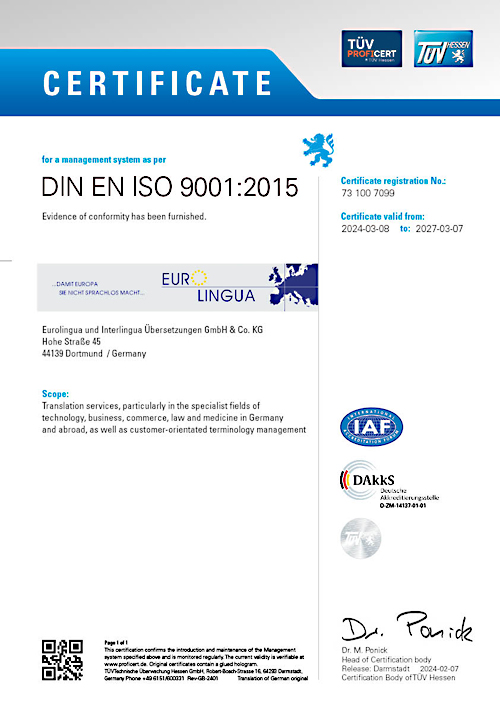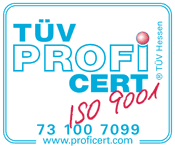
WELCOME TO EUROLINGUA UND INTERLINGUA ÜBERSETZUNGEN!
In 1997, Eurolingua was one of the first translation agencies / translation service providers to introduce the QM system in accordance with DIN EN ISO 9000ff and in 2010 the QM system in accordance with DIN EN 15038:2006 Translation Services - Service Requirements, and always works with the latest standard, at present according to DIN EN ISO 9001:2015.
Translations from one language to another, whether in writing or orally as interpreting, have always been highly demanding. Detailed knowledge of the respective subject areas, taking into account the target group, context and/or cultural nuances, makes the meticulous handling of your assignments essential.
Not only the formal, content-related and linguistic structures of a given text must be correctly understood, analysed and translated into a text intended for a different living and cultural environment, but also the implicit meaning must be conveyed, which makes literary translations in particular a special challenge. Taking into account the respective type of text, the individual text function must always be fulfilled.
People have been dealing with this problem ever since they had to communicate with others who do not speak their own language. Translations and translators already played an important role as mediators between cultures in earlier eras. Scientific knowledge, important literature and religious works were disseminated through translations and preserved for later generations and other cultures. Interpreters were not only indispensable in art and culture but were also in demand in wartime and during peace negotiations.
In more recent times, with the growing together of Europe and the progressive development of international economic relations, the focus has shifted to the production of specialist translations in areas such as technology, trade, economics or law etc. With the changes in society and technological progress, the professional profile of the translator has also changed. The modern translator is a specialist in specific subject areas and types of texts, while the modern translation agency is a service company. Eurolingua employs well-trained staff who, in addition to excellent language skills, also have the necessary technical knowledge and a range of competences, such as research and translation skills, and who use modern "tools" such as Internet research or translation memory systems such as Transit, Trados alongside online dictionaries and terminology collections, etc.
The current ISO standard DIN EN ISO 9001:2015 serves to ensure a general level of quality. On the other hand, specific requirements are placed on the translator or translation service provider, the translation process and the translation itself with regard to the use of appropriate human and technical resources, quality and project management, the creation of contractual frameworks and the development of documented procedures for the provision of the service.
Eurolingua und Interlingua Übersetzungen GmbH & Co. KG are not only committed to meeting the requirements of the standard.
Quality is a top priority at Eurolingua. Our quality management system, which has been built from the ground up over decades, receives its certifications through regular inspections by certifiers and recertifiers from recognised German accreditation and certification bodies.
Certification of the company according to DIN EN ISO 9001:2015 took place on 08.03.2024.
In the framework of this system, Eurolingua und Interlingua Übersetzungen GmbH & Co. KG is committed to compliance with a quality policy that has the primary objective of achieving the best possible customer satisfaction and its continuous improvement.

Translation agency - translation agencies - translation agencies Dortmund - translator Dortmund - translation Dortmund - translations - translations Dortmund - translate Dortmund· translator Dortmund - interpreter Dortmund - translation work - certified translation agency - translations in accordance with DIN EN ISO 9001:2015 -









